- Home
- Samuel Beckett
Stories and Texts for Nothing Page 2
Stories and Texts for Nothing Read online
Page 2
Yes, surprising though it may seem, I still had a little money at this time. The small sum my father had left me as a gift, with no restrictions, at his death, I still wonder if it wasn't stolen from me. Then I had none. And yet my life went on, and even in the way I wanted, up to a point. The great disadvantage of this condition, which might be defined as the absolute impossibility of all purchase, is that it compels you to bestir yourself. It is rare, for example, when you are completely penniless, that you can have food brought to you from time to time in your retreat. You are therefore obliged to go out and bestir yourself, at least one day a week. You can hardly have a home address under these circumstances, it's inevitable. It was therefore with a certain delay that I learnt they were looking for me, for an affair concerning me. I forget through what channel. I did not read the newspapers, nor do I remember having spoken with anyone during these years, except perhaps three or four times, on the subject of food. At any rate, I must have had wind of the affair one way or another, otherwise I would never have gone to see the lawyer, Mr Nidder, strange how one fails to forget certain names, and he would never have received me. He verified my identity. That took some time. I showed him the metal initials in the lining of my hat, they proved nothing but they increased the probabilities. Sign, he said. He played with a cylindrical ruler, you could have felled an ox with it. Count, he said. A young woman, perhaps venal, was present at this interview, as a witness no doubt. I stuffed the wad in my pocket. You shouldn't do that, he said. It occurred to me that he should have asked me to count before I signed, it would have been more in order. Where can I reach you, he said, if necessary? At the foot of the stairs I thought of something. Soon after I went back to ask him where this money came from, adding that I had a right to know. He gave me a woman's name that I've forgotten. Perhaps she had dandled me on her knees while I was still in swaddling clothes and there had been some lovey-dovey. Sometimes that suffices. I repeat, in swaddling clothes, for any later it would have been too late, for lovey-dovey. It is thanks to this money then that I still had a little. Very little. Divided by my life to come it was negligible, unless my conjectures were unduly pessimistic. I knocked on the partition beside my hat, right in the cabman's back if my calculations were correct. A cloud of dust rose from the upholstery. I took a stone from my pocket and knocked with the stone, until the cab stopped. I noticed that, unlike most vehicles, which slow down before stopping, the cab stopped dead. I waited. The whole cab shook. The cabman, on his high seat, must have been listening. I saw the horse as with my eyes of flesh. It had not lapsed into the drooping attitude of its briefest halts, it remained alert, its ears pricked up. I looked out of the window, we were again in motion. I banged again on the partition, until the cab stopped again. The cabman got down cursing from his seat. I lowered the window to prevent his opening the door. Faster, faster. He was redder than ever, purple in other words. Anger, or the rushing wind. I told him I was hiring him for the day. He replied that he had a funeral at three o'clock. Ah the dead. I told him I had changed my mind and no longer wished to go to the Zoo. Let us not go to the Zoo, I said. He replied that it made no difference to him where we went, provided it wasn't too far, because of his beast. And they talk to us about the specificity of primitive peoples' speech. I asked him if he knew of an eating-house. I added, You'll eat with me. I prefer being with a regular customer in such places. There was a long table with two benches of exactly the same length on either side. Across the table he spoke to me of his life, of his wife, of his beast, then again of his life, of the atrocious life that was his, chiefly because of his character. He asked me if I realized what it meant to be out of doors in all weathers. I learnt there were still some cabmen who spent their day snug and warm inside their cabs on the rank, waiting for a customer to come and rouse them. Such a thing was possible in the past, but nowa-days other methods were necessary, if a man was to have a little laid up at the end of his days. I described my situation to him, what I had lost and what I was looking for. We did our best, both of us, to understand, to explain. He understood that I had lost my room and needed another, but all the rest escaped him. He had taken it into his head, whence nothing could ever dislodge it, that I was looking for a furnished room. He took from his pocket an evening paper of the day before, or perhaps the day before that again, and proceeded to run through the advertisements, five or six of which he underlined with a tiny pencil, the same that hovered over the likely outsiders. He underlined no doubt those he would have underlined if he had been in my shoes, or perhaps those concentrated in the same district, because of his beast. I would only have confused him by saying that I could tolerate no furniture in my room except the bed, and that all the other pieces, and even the very night table, had to be removed before I would consent to set foot in it. About three o'clock we roused the horse and set off again. The cabman suggested I climb up beside him on the seat, but for some time already I had been dreaming of the inside of the cab and I got back inside. We visited, methodically I hope, one after another, the addresses he had underlined. The short winter's day was drawing to a close. It seems to me sometimes that these are the only days I have ever known, and especially that most charming moment of all, just before night wipes them out. The addresses he had underlined, or rather marked with a cross, as common people do, proved fruitless one by one, and one by one he crossed them out with a diagonal stroke. Later he showed me the paper, advising me to keep it safe so as to be sure not to look again where I had already looked in vain. In spite of the closed windows, the creaking of the cab and the traffic noises, I heard him singing, all alone aloft on his high seat. He had preferred me to a funeral, this was a fact which would endure forever. He sang, She is far from the land where her young hero, those are the only words I remember. At each stop he got down from his seat and helped me get down from mine. I rang at the door he directed me to, and sometimes 1 disappeared inside the house. It was a strange feeling, I remember, a house all about me again, after so long. He waited for me on the side-walk and helped me climb back into the cab. I was sick and tired of this cabman. He clambered back to his seat and we set off again. At a certain moment there occurred this. He stopped. I shook off my torpor and made ready to get down. But he did not come to open the door and offer me his arm, so that I was obliged to get down by myself. He was lighting the lamps. I love oil lamps, in spite of their having been, with candles, and if I except the stars, the first lights I ever knew. I asked him if I might light the second lamp, since he had already lit the first himself. He gave me his box of matches, I swung open on its hinges the little convex glass, lit and closed at once, so that the wick might burn steady and bright snug in its little house, sheltered from the wind. I had this joy. We saw nothing, by the light of these lamps, save the vague outlines of the horse, but the others saw them from afar, two yellow glows sailing slowly through the air. When the equipage turned an eye could be seen, red or green as the case might be, a bossy rhomb as clear and keen as stained glass.
After we had verified the last address the cabman suggested bringing me to a hotel he knew where I would be comfortable. That makes sense, cabman, hotel, it's plausible. With his recommendation I would want for nothing. Every convenience, he said, with a wink. I place this conversation on the sidewalk, in front of the house from which I had just emerged. I remember, beneath the lamp, the flank of the horse, hollow and damp, and on the handle of the door the cabman's hand in its woollen glove. The roof of the cab was on a level with my neck. I suggested we have a drink. The horse had neither eaten nor drunk all day. I mentioned this to the cabman, who replied that his beast would take no food till it was back in the stable. If it ate anything whatever, during work, were it but an apple or a lump of sugar, it would have stomach pains and colics that would root it to the spot and might even kill it. That was why he was compelled to tie its jaws together with a strap whenever for one reason or another he had to let it out of his sight, so that it would not have to suffer from the kind hearts of the passers-by.
After a few drinks the cabman invited me to do his wife and him the honour of spending the night in their home. It was not far. Recollecting these emotions, with the celebrated advantage of tranquillity, it seems to me he did nothing else, all that day, but turn about his lodging. They lived above a stable, at the back of a yard. Ideal location, I could have done with it. Having presented me to his wife, extraordinarily full-bottomed, he left us. She was manifestly ill at ease, alone with me. I could understand her, I don't stand on ceremony on these occasions. No reason for this to end or go on. Then let it end. I said I would go down to the stable and sleep there. The cabman protested. I insisted. He drew his wife's attention to the pustule on top of my skull, for I had removed my hat out of civility. He should have that removed, she said. The cabman named a doctor he held in high esteem who had rid him of an induration of the seat. If he wants to sleep in the stable, said his wife, let him sleep in the stable. The cabman took the lamp from the table and preceded me down the stairs, or rather ladder, which descended to the stable, leaving his wife in the dark. He spread a horse blanket on the ground in a corner on the straw and left me a box of matches in case I needed to see clearly in the night. I don't remember what the horse was doing all this time. Stretched out in the dark I heard the noise it made as it drank, a noise like no other, the sudden gallop of the rats, and above me the muffled voices of the cabman and his wife as they criticized me. I held the box of matches in my hand, a big box of safety matches. I got up during the night and struck one. Its brief flame enabled me to locate the cab. I was seized, then abandoned, by the desire to set fire to the stable. I found the cab in the dark, opened the door, the rats poured out, I climbed in. As I settled down I noticed that the cab was no longer level, it was inevitable, with the shafts resting on the ground. It was better so, that allowed me to lie well back, with my feet higher than my head on the other seat. Several times during the night I felt the horse looking at me through the window and the breath of its nostrils. Now that it was unharnessed it must have been puzzled by my presence in the cab. I was cold, having forgotten to take the blanket, but not quite enough to go and get it. Through the window of the cab I saw the window of the stable, more and more clearly. I got out of the cab. It was not so dark now in the stable, I could make out the manger, the rack, the harness hanging, what else, buckets and brushes. I went to the door but couldn't open it. The horse didn't take its eyes off me. Don't horses ever sleep? It seemed to me the cabman should have tied it, to the manger for example. So I was obliged to leave by the window. It wasn't easy. But what is easy? I went out head first, my hands were flat on the ground of the yard while my legs were still thrashing to get clear of the frame. I remember the tufts of grass on which I pulled with both hands, in my efforts to extricate myself. I should have taken off my greatcoat and thrown it through the window, but that would have meant thinking of it. No sooner had I left the yard than I thought of something. Weakness. I slipped a banknote in the match box, went back to the yard and placed the box on the sill of the window through which I had just come. The horse was at the window. But after I had taken a few steps in the street I returned to the yard and took back my banknote. I left the matches, they were not mine. The horse was still at the window. I was sick and tired of this cabhorse. Dawn was just breaking. I did not know where I was. I made towards the rising sun, towards where I thought it should rise, the quicker to come into the light. I would have liked a sea horizon, or a desert one. When I am abroad in the morning, I go to meet the sun, and in the evening, when I am abroad, I follow it, till I am down among the dead. I don't know why I told this story. I could just as well have told another. Perhaps some other time I'll be able to tell another. Living souls, you will see how alike they are.
—Translated by RICHARD SEAVER
in collaboration with the author
THE CALMATIVE
I don't know when I died. It always seemed to me I died old, about ninety years old, and what years, and that my body bore it out, from head to foot. But this evening, alone in my icy bed, I have the feeling I'll be older than the day, the night, when the sky with all its lights fell upon me, the same I had so often gazed on since my first stumblings on the distant earth. For I'm too frightened this evening to listen to myself rot, waiting for the great red lapses of the heart, the tearings at the caecal walls, and for the slow killings to finish in my skull, the assaults on unshakable pillars, the fornications with corpses. So I'll tell myself a story, I'll try and tell myself another story, to try and calm myself, and it's there I feel I'll be old, old, even older than the day I fell, calling for help, and it came. Or is it possible that in this story I have come back to life, after my death? No, it's not like me to come back to life, after my death.
What possessed me to stir when I wasn't with anybody? Was I being thrown out? No, I wasn't with anybody. I see a kind of den littered with empty tins. And yet we are not in the country. Perhaps it's just ruins, a ruined folly, on the skirts of the town, in a field, for the fields come right up to our walls, their walls, and the cows lie down at night in the lee of the ramparts. I have changed refuge so often, in the course of my rout, that now I can't tell between dens and ruins. But there was never any city but the one. It is true you often move along in a dream, houses and factories darken the air, trams go by, and under your feet wet from the grass there are suddenly cobbles. I only know the city of my childhood, I must have seen the other, but unbelieving. All I say cancels out, I'll have said nothing. Was I hungry itself? Did the weather tempt me? It was cloudy and cool, I insist, but not to the extent of luring me out. I couldn't get up at the first attempt, nor let us say at the second, and once up, propped against the wall, I wondered if I could go on, I mean up, propped against the wall. Impossible to go out and walk. I speak as though it all happened yesterday. Yesterday indeed is recent, but not enough. For what I tell this evening is passing this evening, at this passing hour. I'm no longer with these assassins, in this bed of terror, but in my distant refuge, my hands twined together, my head bowed, weak, breathless, calm, free, and older than I'll have ever been, if my calculations are correct. I'll tell my story in the past none the less, as though it were a myth, or an old fable, for this evening I need another age, that age to become another age in which I became what I was.
But little by little I got myself out and started walking with short steps among the trees, oh look, trees! The paths of other days were rank with tangled growth. I leaned against the trunks to get my breath and pulled myself forward with the help of boughs. Of my last passage no trace remained. They were the perishing oaks immortalized by d'Aubigné. It was only a grove. The fringe was near, a light less green and kind of tattered told me so, in a whisper. Yes, no matter where you stood, in this little wood, and were it in the furthest recess of its poor secrecies, you saw on every hand the gleam of this pale light, promise of God knows what fatuous eternity. Die without too much pain, a little, that's worth your while. Under the blind sky close with your own hands the eyes soon sockets, then quick into carrion not to mislead the crows. That's the advantage of death by drowning, one of the advantages, the crabs never get there too soon. But here a strange thing, I was no sooner free of the wood at last, having crossed unminding the ditch that girdles it, than thoughts came to me of cruelty, the kind that smiles. A lush pasture lay before me, nonsuch perhaps, who cares, drenched in evening dew or recent rain. Beyond this meadow to my certain knowledge a path, then a field and finally the ramparts, closing the prospect. Cyclopean and crenellated, standing out faintly against a sky scarcely less sombre, they did not seem in ruins, viewed from mine, but were, to my certain knowledge. Such was the scene offered to me, in vain, for I knew it well and loathed it. What I saw was a bald man in a brown suit, a comedian. He was telling a funny story about a fiasco. Its point escaped me. He used the word snail, or slug, to the delight of all present. The women seemed even more entertained than their escorts, if that were possible. Their shrill laughter pierced the clapping and, when this had subsi
ded, broke out still here and there in sudden peals even after the next story had begun, so that part of it was lost. Perhaps they had in mind the reigning penis sitting who knows by their side and from that sweet shore launched their cries of joy towards the comic vast, what a talent. But it's to me this evening something has to happen, to my body as in myth and metamorphosis, this old body to which nothing ever happened, or so little, which never met with anything, loved anything, wished for anything, in its tarnished universe, except for the mirrors to shatter, the plane, the curved, the magnifying, the minifying, and to vanish in the havoc of its images. Yes, this evening it has to be as in the story my father used to read to me, evening after evening, when I was small, and he had all his health, to calm me, evening after evening, year after year it seems to me this evening, which I don't remember much about, except that it was the adventures of one Joe Breem, or Breen, the son of a lighthouse-keeper, a strong muscular lad of fifteen, those were the words, who swam for miles in the night, a knife between his teeth, after a shark, I forget why, out of sheer heroism. He might have simply told me the story, he knew it by heart, so did I, but that wouldn't have calmed me, he had to read it to me, evening after evening, or pretend to read it to me, turning the pages and explaining the pictures that were of me already, evening after evening the same pictures, till I dozed off on his shoulder. If he had skipped a single word I would have hit him, with my little fist, in his big belly bursting out of the old cardigan and unbuttoned trousers that rested him from his office canonicals. For me now the setting forth, the struggle and perhaps the return, for the old man I am this evening, older than my father ever was, older than I shall ever be. I crossed the meadow with little stiff steps at the same time limp, the best I could manage. Of my last passage no trace remained, it was long ago. And the little bruised stems soon straighten up again, having need of air and light, and as for the broken their place is soon taken. I entered the town by what they call the Shepherds' Gate without having seen a soul, only the first bats like flying crucifixions, nor heard a sound except my steps, my heart in my breast and then, as I went under the arch, the hoot of an owl, that cry at once so soft and fierce which in the night, calling, answering, through my little wood and those nearby, sounded in my shelter like a tocsin. The further I went into the city the more I was struck by its deserted air. It was lit as usual, brighter than usual, although the shops were shut. But the lights were on in their windows with the object no doubt of attracting customers and prompting them to say, I say, I like that, not dear either, I'll come back tomorrow, if I'm still alive. I nearly said, Good God it's Sunday. The trams were running, the buses too, but few, slow, empty, noiseless, as if under water. I didn't see a single horse! I was wearing my long green greatcoat with the velvet collar, such as motorists wore about 1900, my father's, but that day it was sleeveless, a vast cloak. But on me it was still the same great dead weight, with no warmth to it, and the tails swept the ground, scraped it rather, they had grown so stiff, and I so shrunken. What would, what could happen to me in this empty place? But I felt the houses packed with people, lurking behind the curtains they looked out into the street or, crouched far back in the depths of the room, head in hands, were sunk in dream. Up aloft my hat, the same as always, I reached no further. I went right across the city and came to the sea, having followed the river to its mouth. I kept saying, I'll go back, unbelieving. The boats at anchor in the harbour, tied up to the jetty, seemed no less numerous than usual, as if I knew anything about what was usual. But the quays were deserted and there was no sign or stir of arrival or departure. But all might change from one moment to the next and be transformed like magic before my eyes. Then all the bustle of the people and things of the sea, the masts of the big craft gravely rocking and of the small more jauntily, I insist, and I'd hear the gulls' terrible cry and perhaps the sailors' cry. And I might slip unnoticed aboard a freighter outward bound and get far away and spend far away a few good months, perhaps even a year or two, in the sun, in peace, before I died. And without going that far it would be a sad state of affairs if in that unscandalizable throng I couldn't achieve a little encounter that would calm me a little, or exchange a few words with a navigator for example, words to carry away with me to my refuge, to add to my collection. I waited sitting on a kind of topless capstan, saying, The very capstans this evening are out of order. And I gazed out to sea, out beyond the breakwaters, without sighting the least vessel. I could see lights flush with the water. And the pretty beacons at the harbour mouth I could see too, and others in the distance, flashing from the coast, the islands, the headlands. But seeing still no sign or stir I made ready to go, to turn away sadly from this dead haven, for there are scenes that call for strange farewells. I had merely to bow my head and look down at my feet, for it is in this attitude I always drew the strength to, how shall I say, I don't know, and it was always from the earth, rather than from the sky, notwithstanding its reputation, that my help came in time of trouble. And there, on the flagstone, which I was not focussing, for why focus it, I saw haven afar, where the black swell was most perilous, and all about me storm and wreck. I'll never come back here, I said. But when with a thrust of both hands against the rim of the capstan I heaved myself up I found facing me a young boy holding a goat by a horn. I sat down again. He stood there silent looking at me without visible fear or revulsion. Admittedly the light was poor. His silence seemed natural to me, it befitted me as the elder to speak first. He was barefoot and in rags. Haunter of the waterfront he had stepped aside to see what the dark hulk could be abandoned on the quayside. Such was my train of thought. Close up to me now with his little guttersnipe's eye there could be no doubt left in his mind. And yet he stayed. Can this base thought be mine? Moved, for after all that is what I must have come out for, in a way, and with little expectation of advantage from what might follow, I resolved to speak to him. So I marshalled the words and opened my mouth, thinking I would hear them. But all I heard was a kind of rattle, unintelligible even to me who knew what was intended. But it was nothing, mere speech-lessness due to long silence, as in the wood that darkens the mouth of hell, do you remember, I only just. Without letting go of his goat he moved right up against me and offered me a sweet out of a twist of paper such as you could buy for a penny. I hadn't been offered a sweet for eighty years at least, but I took it eagerly and put it in my mouth, the old gesture came back to me, more and more moved since that is what I wanted. The sweets were stuck together and I had my work cut out to separate the top one, a green one, from the others, but he helped me and his hand brushed mine. And a moment later as he made to move away, hauling his goat after him, with a great gesticulation of my whole body I motioned him to stay and I said, in an impetuous murmur, Where are you off to, my little man, with your nanny? The words were hardly out of my mouth when for shame I covered my face. And yet they were the same I had tried to utter but a moment before. Where are you off to, my little man, with your nanny! If I could have blushed I would have, but there was not enough blood left in my extremities. If I had had a penny in my pocket I would have given it to him, for him to forgive me, but I did not have a penny in my pocket, nor anything resembling it. Nothing that could give pleasure to a little unfortunate at the mouth of life. I suspect I had nothing with me but my stone, that day, having gone out as it were without premeditation. Of his little person I was fated to see no more than the black curly hair and the pretty curve of the long bare legs all muscle and dirt. And the hand, so fresh and keen, I would not forget in a hurry either. I looked for better words to say to him, I found them too late, he was gone, oh not far, but far. Out of my life too he went without a care, not one of his thoughts would ever be for me again, unless perhaps when he was old and, delving in his boyhood, would come upon that gallows night and hold the goat by the horn again and linger again a moment by my side, with who knows perhaps a touch of tenderness, even of envy, but I have my doubts. Poor dear dumb beasts, how you will have helped me. What does your daddy do? that's wh
at I would have said to him if he had given me the chance. Soon they were no more than a single blur which if I hadn't known I might have taken for a young centaur. I was nearly going to have the goat dung, then pick up a handful of the pellets so soon cold and hard, sniff and even taste them, no, that would not help me this evening. I say this evening as if it were always the same evening, but are there two evenings? I went, intending to get back as fast as I could, but it would not be quite empty-handed, repeating, I'll never come back here. My legs were paining me, every step would gladly have been the last, but the glances I darted towards the windows, stealthily, showed me a great cylinder sweeping past as though on rollers on the asphalt. I must indeed have been moving fast, for I overhauled more than one pedestrian, there are the first men, without extending myself, I who in the normal way was left standing by cripples, and then I seemed to hear the footfalls die behind me. And yet each little step would gladly have been the last. So much so that when I emerged on a square I hadn't noticed on the way out, with a cathedral looming on the far side, I decided to go in, if it was open, and hide, as in the Middle Ages, for a space. I say cathedral, it may not have been, I don't know, all I know is it would vex me in this story that aspires to be the last, to have taken refuge in a common church. I remarked the Saxon Stützenwechsel. Charming effect, but it didn't charm me. The brilliantly lit nave appeared deserted. I walked round it several times without seeing a soul. They were hiding perhaps, under the choir-stalls, or dodging behind the pillars, like woodpeckers. Suddenly close to where I was, and without my having heard the long preliminary rumblings, the organ began to boom. I sprang up from the mat on which I lay before the altar and hastened to the far end of the nave as if on my way out. But it was a side aisle and the door I disappeared through was not the exit. For instead of being restored to the night I found myself at the foot of a spiral staircase which I began to climb at top speed, mindless of my heart, like one hotly pursued by a homicidal maniac. This staircase faintly lit by I know not what means, slits perhaps, I mounted panting as far as the projecting gallery in which it culminated and which, separated from the void by a cynical parapet, encompassed a smooth round wall capped by a little dome covered with lead or verdigrised copper, phew, if that's not clear. People must have come here for the view, those who fall die on the way. Flattening myself against the wall I started round, clockwise. But I had hardly gone a few steps when I met a man revolving in the other direction, with the utmost circumspection. How I'd love to push him, or him to push me, over the edge. He gazed at me wild-eyed for a moment and then, not daring to pass me on the parapet side and surmising correctly that I would not relinquish the wall just to oblige him, abruptly turned his back on me, his head rather, for his back remained glued to the wall, and went back the way he had come so that soon there was nothing left of him but a left hand. It lingered a moment, then slid out of sight. All that remained to me was the vision of two burning eyes starting out of their sockets under a check cap. Into what nightmare thingness am I fallen? My hat flew off, but did not get far thanks to the string. I turned my head towards the staircase and lent an eye. Nothing. Then a little girl came into view followed by a man holding her by the hand, both pressed against the wall. He pushed her into the stairway, disappeared after her, turned and raised towards me a face that made me recoil. I could only see his bare head above the top step. When they were gone I called. I completed in haste the round of the gallery. No one. I saw on the horizon, where sky, sea, plain and mountain meet, a few low stars, not to be confused with the fires men light, at night, or that go alight alone. Enough. Back in the street I tried to find my way in the sky, where I knew the Bears so well. If I had seen someone I would have stopped him to ask, the most ferocious aspect would not have daunted me. I would have said, touching my hat, Pardon me your honour, the Shepherds' Gate for the love of God. I thought I could go no further, but no sooner had the impetus reached my legs than on I went, believe it or not, at a very fair pace. I wasn't returning empty-handed, not quite, I was taking back with me the virtual certainty that I was still of this world, of that world too, in a way. But I was paying the price. I would have done better to spend the night in the cathedral, on the mat before the altar, I would have continued on my way at first light, or they would have found me stretched out in the rigor of death, the genuine bodily article, under the blue eyes fount of so much hope, and put me in the evening papers. But suddenly I was descending a wide street, vaguely familiar, but in which I could never have set foot, in my lifetime. But soon realizing I was going downhill I turned about and set off in the other direction. For I was afraid if I went downhill of returning to the sea where I had sworn never to return. When I say I turned about I mean I wheeled round in a wide semi-circle without slowing down, for I was afraid if I stopped of not being able to start again, yes, I was afraid of that too. And this evening too I dare not stop. I was struck more and more by the contrast between the brightly lit streets and their deserted air. To say it distressed me, no, but I say it all the same, in the hope of calming myself. To say there was no one abroad, no, I would not go that far, for I remarked a number of shapes, male and female, strange shapes, but not more so than usual. As to what hour it might have been I had no idea, except that it must have been some hour of the night. But it might have been three or four in the morning just as it might have been ten or eleven in the evening, depending no doubt on whether one wondered at the scarcity of passers-by or at the extraordinary radiance shed by the street-lamps and traffic-lights. For at one or other of these no one could fail to wonder, unless he was out of his mind. Not a single private car, but admittedly from time to time a public vehicle, slow sweep of light silent and empty. It is not my wish to labour these antinomies, for we are needless to say in a skull, but I have no choice but to add the following few remarks. All the mortals I saw were alone and as if sunk in themselves. It must be a common sight, but mixed with something else I imagine. The only couple was two men grappling, their legs intertwined. I only saw one cyclist! He was going the same way as I was. All were going the same way as I was, vehicles too, I have only just realized it. He was pedalling slowly in the middle of the street, reading a newspaper which he held with both hands spread open before his eyes. Every now and then he rang his bell without interrupting his reading. I watched him recede till he was no more than a dot on the horizon. Suddenly a young woman perhaps of easy virtue, dishevelled and her dress in disarray, darted across the street like a rabbit. That is all I had to add. But here a strange thing, yet another, I had no pain whatever, not even in my legs. Weakness. A good night's nightmare and a tin of sardines would restore my sensitivity. My shadow, one of my shadows, flew before me, dwindled, slid under my feet, trailed behind me the way shadows will. This degree of opacity appeared to me conclusive. But suddenly ahead of me a man on the same side of the street and going the same way, to keep harping on the same thing lest I forget. The distance between us was considerable, seventy paces at least, and fearing he might escape me I quickened my step with the result I swept forward as if on rollers. This is not me, I said, let us make the most of it. Finding myself in an instant a bare ten paces in his rear I slowed down so as not to burst in on him and so heighten the aversion my person inspired even in its most abject and obsequious attitudes. And a moment later, keeping humbly in step with him, Excuse me your honour, the Shepherds' Gate for the love of God! At close quarters he appeared normal apart from that air already noted of ebbing inward. I drew a few steps ahead, turned, cringed, touched my hat and said, The right time for mercy's sake! I might as well not have existed. But what about the sweet? A light! I cried. Given my need of help I can't think why I did not bar his path. I couldn't have, that's all, I couldn't have touched him. Seeing a stone seat by the kerb I sat down and crossed my legs, like Walther. I must have dozed off, for the next thing was a man sitting beside me. I was still taking him in when he opened his eyes and set them on me, as if for the first time, for he shrank back unaffectedly. Where did you sp
ring from? he said. To hear myself addressed again so soon impressed me greatly. What's the matter with you? he said. I tried to look like one with whom that only is the matter which is native to him. Forgive me your honour, I said, gingerly lifting my hat and rising a fraction from the seat, the right time for the love of God! He said a time, I don't remember which, a time that explained nothing, that's all I remember, and did not calm me. But what time could have done that? Oh I know, I know, one will come that will. But in the meantime? What's that you said? he said. Unfortunately I had said nothing. But I wriggled out of it by asking him if he could help me find my way which I had lost. No, he said, for I am not from these parts and if I am sitting on this slab it is because the hotels were full or would not let me in, I have no opinion. But tell me the story of your life, then we'll see. My life! I cried. Why yes, he said, you know, that kind of—what shall I say? He brooded for a time, no doubt trying to think of what life could well be said to be a kind. In the end he went on, testily, Come now, everyone knows that. He jogged me in the ribs. No details, he said, the main drift, the main drift. But as I remained silent he said, Shall I tell you mine, then you'll see what I mean. The account he then gave was brief and dense, facts, without comment. That's what I call a life, he said, do you follow me now? It wasn't bad, his story, positively fairy-like in places. But that Pauline, I said, are you still with her? I am, he said, but I'm going to leave her and set up with another, younger and plumper. You travel a lot, I said. Oh widely, widely, he said. Words were coming back to me, and the way to make them sound. All that's a thingof the past for you no doubt, he said. Do you think of spending some time among us? I said. This sentence struck me as particularly well turned. If it's not a rude question, he said, how old are you? I don't know, I said. You don't know! he cried. Not exactly, I said. Are thighs much in your thoughts, he said, arses, cunts and environs. I didn't follow. No more erections naturally, he said. Erections? I said. The penis, he said, you know what the penis is, there, between the legs. Ah that, I said. It thickens, lengthens, stiffens and rises, he said, does it not? I assented, though they were not the terms I would have used. That is what we call an erection, he said. He pondered, then exclaimed, Phenomenal! No? Strange right enough, I said. And there you have it all, he said. But what will become of her? I said. Who? he said. Pauline, I said. She will grow old, he said with tranquil assurance, slowly at first, then faster and faster, in pain and bitterness, pulling the devil by the tail. The face was not full, but I eyed it in vain, it remained clothed in its flesh instead of turning all chalky and channelled as with a gouge. The very vomer kept its cushion. It is true discussion was always bad for me. I longed for the tender nonsuch, I would have trodden it gently, with my boots in my hand, and for the shade of my wood, far from this terrible light. What are you grinning and bearing? he said. He held on his knees a big black bag, like a midwife's I imagine. It was full of glittering phials. I asked him if they were all alike. Oho no, he said, for every taste. He took one and held it out to me, saying, One and six. What did he want? To sell it to me? Proceeding on this hypothesis I told him I had no money. No money! he cried. All of a sudden his hand came down on the back of my neck, his sinewy fingers closed and with a jerk and a twist he had me up against him. But instead of dispatching me he began to murmur words so sweet that I went limp and my head fell forward in his lap. Between the caressing voice and the fingers rowelling my neck the contrast was striking. But gradually the two things merged in a devastating hope, if I dare say so, and I dare. For this evening I have nothing to lose that I can discern. And if I have reached this point (in my story) without anything having changed, for if anything had changed I think I'd know, the fact remains I have reached it, and that's something, and with nothing changed, and that's something too. It's no excuse for rushing matters. No, it must cease gently, as gently cease on the stairs the steps of the loved one, who could not love and will not come back, and whose steps say so, that she could not love and will not come back. He suddenly shoved me away and showed me the phial again. There you have it all, he said. It can't have been the same all as before. Want it? he said. No, but I said yes, so as not to vex him. He proposed an exchange. Give me your hat, he said. I refused. What vehemence! he said. I haven't a thing, I said. Try in your pockets, he said. I haven't a thing, I said, I came out without a thing. Give me a lace, he said. I refused. Long silence. And if you gave me a kiss, he said finally. I knew there were kisses in the air. Can you take off your hat? he said. I took it off. Put it back, he said, you look nicer with it on. I put it on. Come on, he said, give me a kiss and let there be an end to it. Did it not occur to him I might turn him down? No, a kiss is not a bootlace, he must have seen from my face that all passion was not quite spent. Come, he said. I wiped my mouth in its tod of hair and advanced it towards his. Just a moment, he said. My mouth stood still. You know what a kiss is? he said. Yes yes, I said? If it's not a rude question, he said, when was your last? Some time ago, I said, but I can still do them. He took off his hat, a bowler, and tapped the middle of his forehead. There, he said, and there only. He had a noble brow, white and high. He leaned forward, closing his eyes. Quick, he said? I pursed up my lips as mother had taught me and brought them down where he had said. Enough, he said. He raised his hand towards the spot, but left the gesture unfinished and put on his hat. I turned away and looked across the street. It was then I noticed we were sitting opposite a horse-butcher's. Here, he said, take it. I had forgotten. He rose. Standing he was quite short. One good turn, he said, with radiant smile. His teeth shone. I listened to his steps die away. How tell what remains. But it's the end. Or have I been dreaming, am I dreaming? No no, none of that, for dream is nothing, a joke, and significant what is worse. I said, Stay where you are till day breaks, wait sleeping till the lamps go out and the streets come to life. But I stood up and moved off. My pains were back, but with something untoward which prevented my wrapping them round me. But I said, Little by little you are coming to. From my gait alone, slow, stiff and which seemed at every step to solve a statodynamic problem never posed before, I would have been known again, if I had been known. I crossed over and stopped before the butcher's. Behind the grille the curtains were drawn, rough canvas curtains striped blue and white, colours of the Virgin, and stained with great pink stains. They did not quite meet in the middle, and through the chink I could make out the dim carcasses of the gutted horses hanging from hooks head downwards. I hugged the walls, famished for shadow. To think that in a moment all will be said, all to do again. And the city clocks, what was wrong with them, whose great chill clang even in my wood fell on me from the air? What else? Ah yes, my spoils. I tried to think of Pauline, but she eluded me, gleamed an instant and was gone, like the young woman in the street. So I went in the atrocious brightness, buried in my old flesh, straining towards an issue and passing them by to left and right, and my mind panting after this and that and always flung back to where there was nothing. I succeeded however in fastening briefly on the little girl, long enough to see her a little more clearly than before, so that she wore a kind of bonnet and clasped in her hand a book, of common prayer perhaps, and to try and have her smile, but she did not smile, but vanished down the staircase without having yielded me her little face. I had to stop. At first nothing, then little by little, I mean rising up out of the silence till suddenly no higher, a land of massive murmur coming perhaps from the house that was propping me up. That reminded me that the houses were full of people, besieged, no, I don't know. When I stepped back to look at the windows I could see, in spite of shutters, blinds and muslins, that many of the rooms were lit. The light was so dimmed by the brilliancy flooding the boulevard that short of knowing or suspecting it was not so one might have supposed everyone sleeping. The sound was not continuous, but broken by silences possibly of consternation. I thought of ringing at the door and asking for shelter and protection till morning. But suddenly I was on my way again. But little by little, in a slow swoon, darkness fell about me. I saw a
mass of bright flowers fade in an exquisite cascade of paling colours. I found myself admiring, all along the house-fronts, the gradual blossoming of squares and rectangles, casement and sash, yellow, green, pink, according to the curtains and blinds, finding that pretty. Then at last, before I fell, first to my knees, as cattle do, then on my face, I was in a throng. I didn't lose consciousness, when I lose consciousness it will not be to recover it. They paid no heed to me, though careful not to walk on me, a courtesy that must have touched me, it was what I had come out for. It was well with me, sated with dark and calm, lying at the feet of mortals, fathom deep in the grey of dawn, if it was dawn. But reality, too tired to look for the right word, was soon restored, the throng fell away, the light came back and I had no need to raise my head from the ground to know I was back in the same blinding void as before. I said, Stay where you are, down on the friendly stone, or at least indifferent, don't open your eyes, wait for morning. But up with me again and back on the way that was not mine, on uphill along the boulevard. A blessing he was not waiting for me, poor old Breem, or Breen. I said, The sea is east, it's west I must go, to the left of north. But in vain I raised without hope my eyes to the sky to look for the Bears. For the light I steeped in put out the stars, assuming they were there, which I doubted, remembering the clouds.

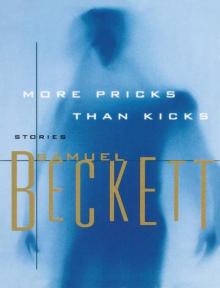 More Pricks Than Kicks
More Pricks Than Kicks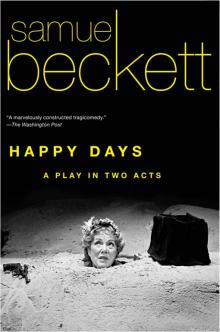 Happy Days
Happy Days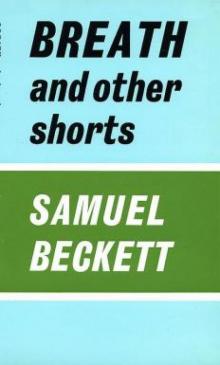 Breath, and Other Shorts
Breath, and Other Shorts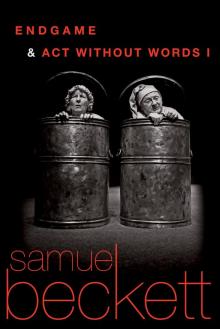 Endgame & Act Without Words
Endgame & Act Without Words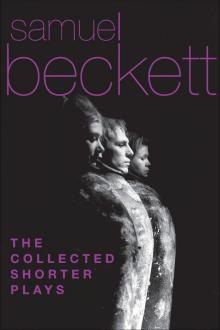 The Collected Shorter Plays of Samuel Beckett
The Collected Shorter Plays of Samuel Beckett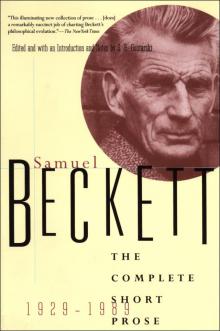 The Complete Short Prose, 1929-1989
The Complete Short Prose, 1929-1989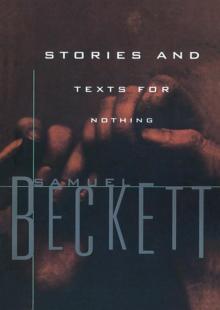 Stories and Texts for Nothing
Stories and Texts for Nothing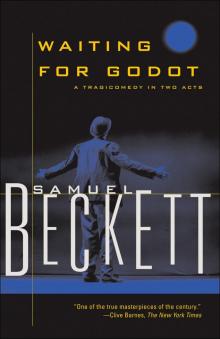 Waiting for Godot
Waiting for Godot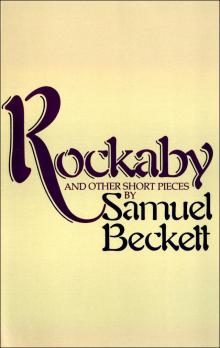 Rockaby and Other Short Pieces
Rockaby and Other Short Pieces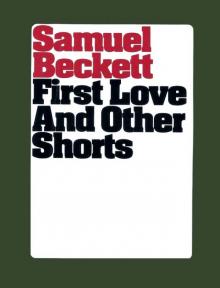 First Love and Other Shorts
First Love and Other Shorts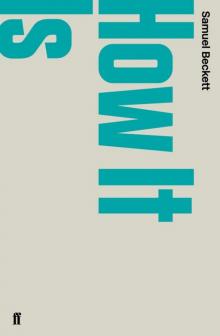 How It Is
How It Is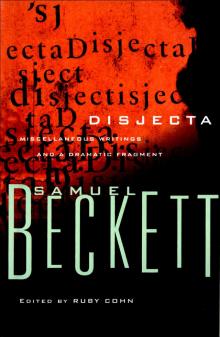 Disjecta: Miscellaneous Writings and a Dramatic Fragment
Disjecta: Miscellaneous Writings and a Dramatic Fragment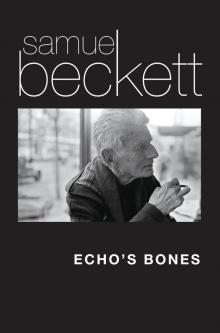 Echo's Bones
Echo's Bones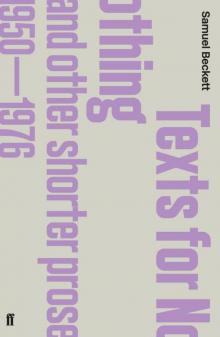 Texts for Nothing and Other Shorter Prose 1950-1976
Texts for Nothing and Other Shorter Prose 1950-1976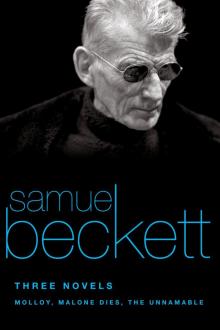 Three Novels
Three Novels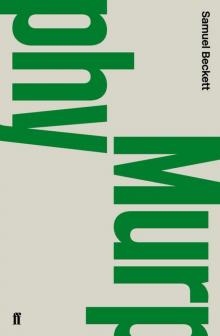 Murphy
Murphy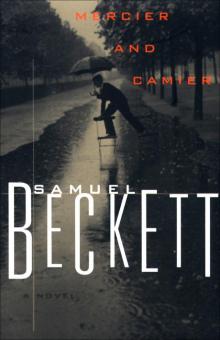 Mercier and Camier
Mercier and Camier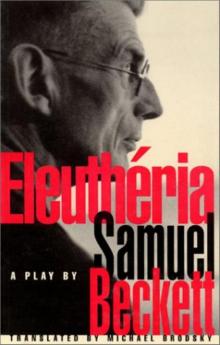 Eleuthéria
Eleuthéria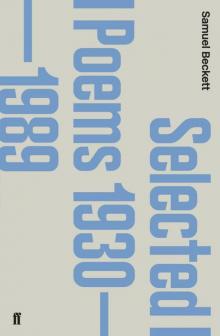 Selected Poems 1930-1988
Selected Poems 1930-1988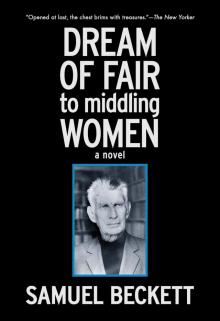 Dream of Fair to Middling Women
Dream of Fair to Middling Women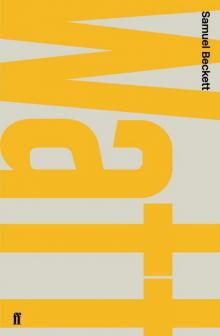 Watt
Watt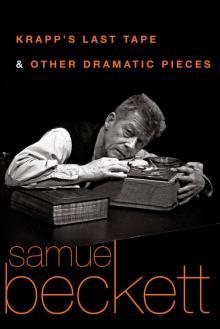 Krapp's Last Tape and Other Dramatic Pieces
Krapp's Last Tape and Other Dramatic Pieces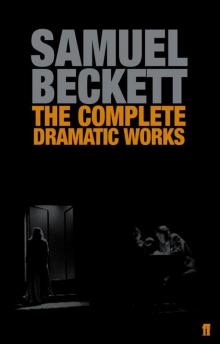 The Complete Dramatic Works of Samuel Beckett
The Complete Dramatic Works of Samuel Beckett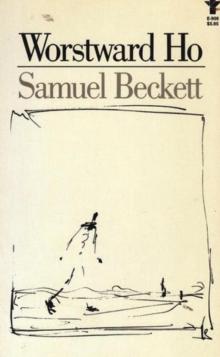 Worstward Ho
Worstward Ho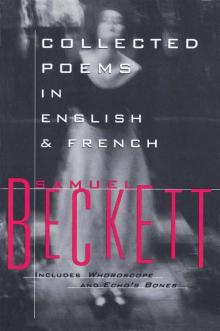 Collected Poems in English and French
Collected Poems in English and French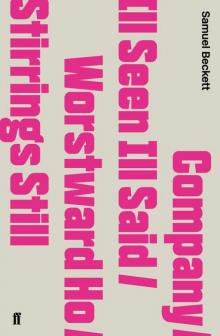 Company / Ill Seen Ill Said / Worstward Ho / Stirrings Still
Company / Ill Seen Ill Said / Worstward Ho / Stirrings Still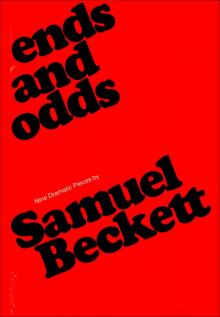 Ends and Odds
Ends and Odds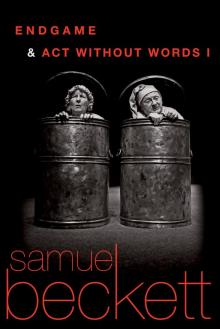 Endgame Act Without Words I
Endgame Act Without Words I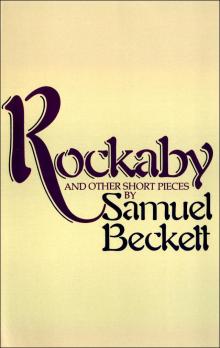 Rockabye and Other Short Pieces
Rockabye and Other Short Pieces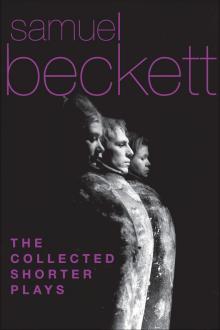 The Collected Shorter Plays
The Collected Shorter Plays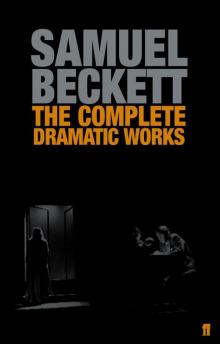 The Complete Dramatic Works
The Complete Dramatic Works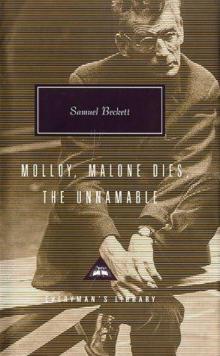 Three Novels: Malloy, Malone Dies, The Unnamable
Three Novels: Malloy, Malone Dies, The Unnamable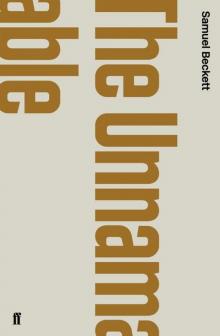 The Unnamable
The Unnamable